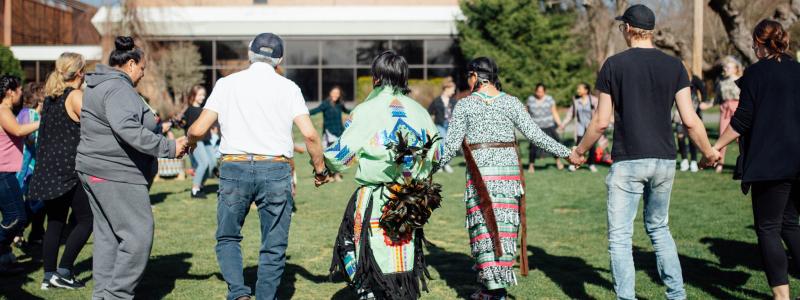“Society is diverse and therefore critical thinkers need to reflect this diversity with their thinking. They must be incarnational and transformational, and exhibit self-sacrifice to learn in order to welcome the Other with open hands in an act of respect.”
— Dr. Matthew Etherington, Professor of Education
As a Christian liberal arts university, Trinity Western thoroughly integrates faith into all aspects of learning. Whether a student studies fine arts, humanities, sciences, human kinetics or business, students are encouraged to learn in ways that foster their creativity, character, moral reflection and critical thinking.
Dr. Matthew Etherington is Professor of Education and Director of TWU’s Institute of Indigenous Issues and Perspectives. His primary interests are in epistemological inclusion in education, Aboriginal pedagogy, outcomes, assessment and philosophy.
In his book, What Teachers Need to Know: Topics in Diversity and Inclusion, he authored an article called “Smashing Down ‘Old’ Ways of Thinking: Uncritical Critical Thinking in Teacher Education.” The article was recently re-published in the journal One World in Dialogue.
In his article, Dr. Etherington expresses concern for popular models of critical thinking, which are biased against traditional knowledge passed down from families and cultures, including Indigenous cultures.
He argues for a more inclusive model of critical thinking.
A critique on critical thinking
Western education has long been dominated by a preference for scientific knowledge over traditional ways of knowing. This privileging of data-based knowledge can lead to the dismissal of Indigenous, religious, or other forms of understanding, as being unscientific and invalid.
In contemporary classrooms, the educator’s job has been to help students reject “old ways of thinking” in favour of science, logic and empirical facts, through the process of critical thinking.
Dr. Etherington believes that the preference for scientific knowledge presents a false dichotomy that forces students to choose between scientific and traditional ways of knowing. He explains that traditional ways of knowing include knowledge from Indigenous peoples and organized religion, knowledge from fundamental traditions and beliefs, and the mystical and spiritual.
The modern way of knowing is utilitarian. Dr. Etherington writes, “Knowledge is supposedly important only if it is useful.” This view leads to discrimination against other forms of knowledge.
“If we accept a privileging of scientific knowledge in the academy,” he writes, “we would have to also discard the traditions of art, literature, music, history, mathematics and many other fields [that are]…grounded in traditions that do not depend on the scientific method for validation.”
"[Good critical thinking] is inquisitive in nature, humble in approach, open-minded, flexible, fair-minded…able to understand diverse viewpoints, traditions and perspectives.”
A false dichotomy of science versus tradition
Dr. Etherington believes that education should not force learners to abandon traditional beliefs and sources of wisdom. He argues for an inclusive model of critical thinking that humbly seeks to understand the context in which the learner comes from — including the learner's own heritage and culture — what the learner values, and why.
Hence, he writes, “Traditions are important for critical thinking because they are owned by people and are part of their story.”
He continues, “All people are embedded in traditions and as such can learn from one another.”
“Traditions are important for critical thinking because they are owned by people and are part of their story...All people are embedded in traditions and as such can learn from one another.”
Critical thinking that promotes human flourishing
A model of critical thinking that welcomes tradition, and ways of knowing that are not strictly empirically-based, opens up our educational systems to be more hospital, and promotes human flourishing.
Dr. Etherington describes a comprehensive critical thinking model as helping students to be “inquisitive in nature, humble in approach, open-minded, flexible, fair-minded…able to understand diverse viewpoints, traditions and perspectives.”
He concluded, “Society is diverse and therefore critical thinkers need to reflect this diversity with their thinking. They must be incarnational and transformational, and exhibit self-sacrifice to learn in order to welcome the Other with open hands in an act of respect.”
Read Dr. Etherington's article, “Smashing Down ‘Old’ Ways of Thinking: Uncritical Critical Thinking in Teacher Education,” in One World in Dialogue.
About Trinity Western University
Founded in 1962, Trinity Western University is Canada’s premier Christian liberal arts university dedicated to equipping students to establish meaningful connections between career, life, and the needs of the world. It is a fully accredited research institution offering liberal arts and sciences, as well as professional schools in business, nursing, education, human kinetics, graduate studies, and arts, media, and culture. It has four campuses and locations: Langley, Richmond-Lansdowne, Richmond-Minoru, and Ottawa. TWU emphasizes academic excellence, research, and student engagement in a vital faith community committed to forming leaders to have a transformational impact on culture. Learn more at www.twu.ca or follow us on Twitter @TrinityWestern, on Facebook and LinkedIn.
For media inquiries, please contact: media@twu.ca

